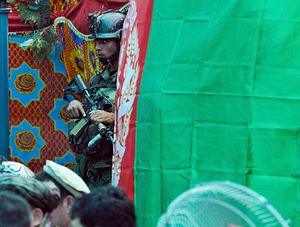As the U.S. and Taliban representatives are busy ironing out their differences regarding the expected “peace deal” which may or may not end the 18-year-long conflict, observers see another threat looming on the Afghan horizon: The Islamic State in Khorasan or IS-K.
IS-K is the Afghan affiliate of the so-called Islamic State (IS) that earned notoriety for its barbaric tactics in the conflicts of the Middle East in much of the last decade.
Since its emergence in eastern Afghanistan in early 2015, IS-K has been responsible for some of the more brutal attacks targeting Afghan civilians and security forces alike.
In its early years, the group took over few districts in eastern Afghanistan and gradually expanded its presence to the comparatively peaceful north. But its onslaught was soon checkmated by Afghan security forces and the Taliban.
Although IS-K has lost the capability, or to say it more precisely, was stopped from attaining the strength, to overrun cities and districts like the Taliban, its ability to carry out sabotage operations and complex attacks such as suicide attacks, large bomb blasts, and targeted killings remains intact.
And this could be the reason that many observers, mostly non-Afghans — some of whom often overlook the country’s tribal dynamics, social fabrics, and local religious sensitivities — fear the rise of IS-K once the Taliban agree to sign deal with the United States and go ahead for peace talks with the Afghan leadership.
However, there exist strong reasons to believe that IS-K has little support, either inside or outside Afghanistan, and little present capability to attack and hold cities. A civil war, in the case that the Afghan leadership and the Taliban fail to agree on a powersharing formula after a U.S. withdrawal, could change those dynamics.
But, if the Taliban and the Afghan government do strike a balance between them, IS-K may not be able to prove a formidable threat for several reasons.
First, an outside support base and sanctuary is a must for an insurgency to continue and flourish. The Taliban quickly recovered from the blows they suffered soon after the 9/11 attacks and subsequent U.S. retaliation because they enjoyed safe havens out of the reach of the U.S. bombing campaigns, night raids, and massive land operations by Afghan and international security forces. Much of the Taliban’s top leadership remained unhurt over the course of the last 18 years, with a few notable exceptions.
But unlike the Taliban, IS-K has no sanctuary and support base in Afghanistan’s neighborhood. The group has also lost its top leaders one after another in drone strikes, bombardment or ground operations. Almost all of Afghanistan’s neighbors – the Central Asian states, China, Pakistan, Iran – have their apprehensions and concerns about the presence of IS-K. They would likely not just cross their fingers and watch IS-K taking over cities and destabilizing their neighborhood. The Taliban, for all of them, is another story — they all have experience working with the Taliban when it was in power in Afghanistan.
Second, the number of IS-K fighters is not beyond a few thousand. While the Taliban have their strength in tens of thousands, the number of IS-K fighters does not exceed 3,000-4,000 at the maximum. The group may have sympathizers in cities—some young zealots in educational institutions in particular—but they can not go beyond planning and organizing terrorist attacks, mostly against soft civilian targets. Meanwhile, its support base both in the east and north is on the decline since losing control of the few remote districts in Nangarhar province in 2016 and 2017.
Third, some have concerns about defections toward IS-K if the Taliban agree on a powersharing formula with the Afghan leadership. While such apprehensions cannot be discounted entirety, it is also true that the Taliban have shown a strong unity of command over the past 18 years. Even if this happens, the scale of such defections may not rise beyond a few thousand, not enough to pose a threat to the Afghan government. Furthermore, unless a top Taliban leader switches sides, a mass defection appears unlikely.
Fourth, Afghan society predominantly belongs to the Hanafi school of Islamic thought, compatible with the Taliban’s brand of Islam. IS-K, on the other hand, follows a strict Salafist interpretation of Islam. Many Islamic rituals, which have almost taken the shape of Pashtun customs and traditions, and are permitted among Hanafis, are viewed as un-Islamic and hereticical by Salafists.
To cite just one simple example: The funeral rituals where the raising of hands for Dua/Fateha (to pray for the departed soul) are a common practice and part of Pashtun culture. But the Salafists strictly prohibit Dua during funerals. They are also against visiting shrines of saints or graves of relatives, which is common practice in Afghanistan, Pakistan, and rest of the region.
Fifth, the Taliban ruled Afghanistan for a period of time. Notwithstanding the widespread grievances against their medieval practices, many in Afghanistan’s rural areas still remember them for bringing “peace” to the country and ensuring “justice.” IS-K has no such support because they have no such history.
While hiccups such as ethnic tensions, warlords, and political differences may halt the peace process and may even create hurdles in the way forward, the threat to the Afghan peace process from groups such as IS-K stands at the very bottom, at least for now.
Daud Khattak is Senior Editor for Radio Free Europe Radio Liberty’s Pashto language Mashaal Radio. Before joining RFE/RL, Khattak worked for The News International and London’s Sunday Times in Peshawar, Pakistan. He has also worked for Pajhwok Afghan News in Kabul. The views expressed here are the author’s own and do not represent those of RFE/RL.

































